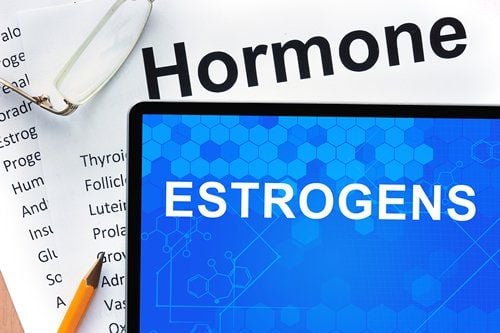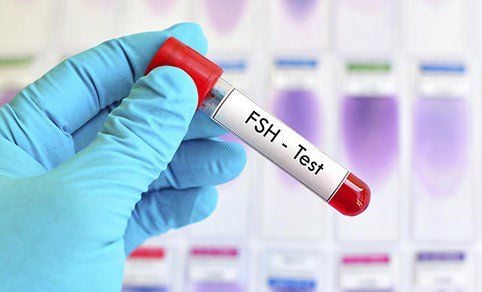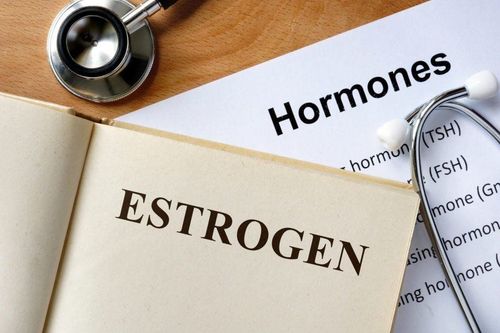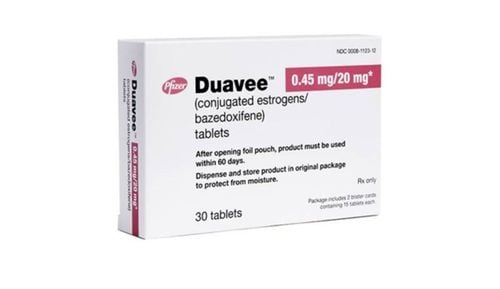This is an automatically translated article.
The article was professionally consulted by MSc Do Hoang Ha - Doctor of Biochemistry, Laboratory Department - Vinmec Hai Phong International General HospitalA woman's perimenopause (also known as the menopausal transition) usually lasts about 2 to 5 years before menstruation stops, a period of transition for a woman's reproductive function. , on average common in the age range from 45 to 55 years old. With the current life expectancy of 80 years, women will have to live for a long time after menopause in a state of hormone deficiency, especially Progesterone and Estrogen, so it is necessary to perform tests. Screening for endocrine disorders to take early corrective measures is a must to help women feel more comfortable when they pass this stage.
1. Quantification of blood estrogen

When the body goes through menopause, the ovaries decline and gradually atrophy, leading to a decrease in estrogen secretion. In fact, when testing for estrogen in the blood at this stage, estrogen is still present in the body but in lower and lower concentrations. The longer a woman lives, the longer she lives after menopause - the longer the menopause, the lower the estrogen hormone. Low hormone levels are not enough to meet the body's needs as well as protect women from diseases, especially cardiovascular diseases (because estrogen affects the regulation of cholesterol produced in the liver). helps protect arteries and heart), osteoporosis (estrogen prevents bone loss, osteoporosis).
Therefore, when a woman enters middle age, her menstrual cycle is no longer stable as usual, accompanied by symptoms such as "hot flashes", dizziness, headache, insomnia, confusion. psychological disorders, ..., should be tested to measure estrogen levels in the blood. If estrogen levels in the blood drop low and you experience these uncomfortable symptoms, treatment with hormone replacement therapy may be considered.
However, estrogen is not only produced in the ovarian stroma, but also in the adrenal follicles, adipose tissue, muscle, and liver. Therefore, not all women going through menopause are completely estrogen deficient. This hormone is produced in many organs in the body, each with different sensitivities. Accordingly, the decline in estrogen may not be enough to produce progesterone for the endometrium to grow to create a menstrual cycle, but it can still be fully produced according to the needs of other tissues. This explains why not all women experience the same symptoms of estrogen deficiency.
2. Quantification of Blood Progesterol
Besides estrogen, progesterone is also one of the important female hormones, building and regulating a woman's menstrual cycle. In addition, progesterone also plays an essential role in pregnancy, facilitating the implantation of the egg. After conception, another amount of progesterone is produced from the placenta to prevent premature birth and protect the normal development of the fetus.Therefore, unlike estrogen, progesterone has tended to decrease gradually as soon as a woman enters perimenopause with irregular menstrual cycles (shortening or thinning, menorrhagia, heavy bleeding). or hypermenorrhoea). By the time menstruation officially ends, almost no test progesterone can be found in the blood, which is indicative of menopause.
3. Quantification of FSH, blood LH

4. Vaginal smear
During the period of sexual activity, under the influence of female hormones, the characteristic vaginal mucosa observed under the electron microscope is the cylindrical epithelial layer of mucus secretion. Therefore, the female vaginal tract always retains the necessary smoothness and moisture.When transitioning through perimenopause - menopause, hormone levels gradually decrease, besides the ovaries and uterus also shrink, the epithelial layer of the vagina also gradually loses its cylindrical elastic structure. The mucosa becomes flattened and atrophied, decreases and gradually loses its ability to excrete, so it dries up, making intercourse painful, easy bleeding and infection.
By indirect observation through smears on vaginal smears, endocrine disorders in female hormones can also be evaluated and alternative therapies considered if necessary.
5. Gynecological ultrasound
The ovaries, uterine wall atrophy, the lining of the uterus gradually thin, blood vessels decrease are evidence of perimenopause - menopause observed on adnexal ultrasound. These are manifestations of the consequences of falling female hormone levels, helping to rule out other conditions that may be co-occurring during this period.Perimenopause is a physiological period in a woman's life with estrogen deficiency as a sign of impending old age. The pre-menopausal health care and examination package at Vinmec is scientifically built to support the implementation of tests to assess early hormonal status. From the test results, doctors will give advice and solutions to help customers no longer feel secure going through perimenopause.
Please dial HOTLINE for more information or register for an appointment HERE. Download MyVinmec app to make appointments faster and to manage your bookings easily.














